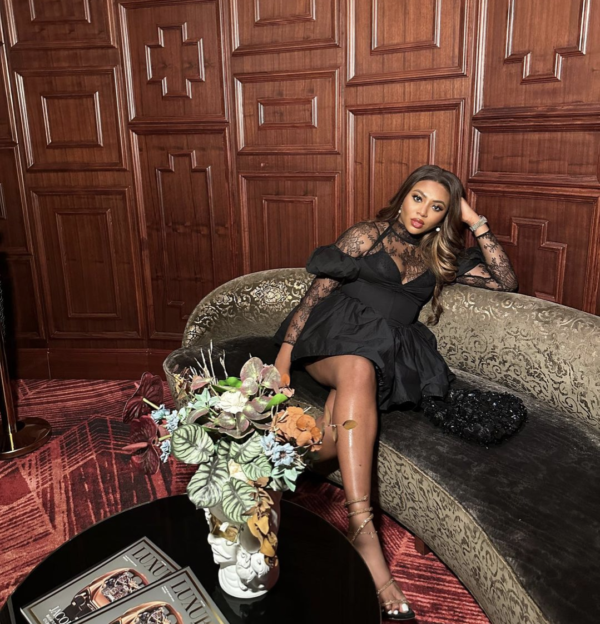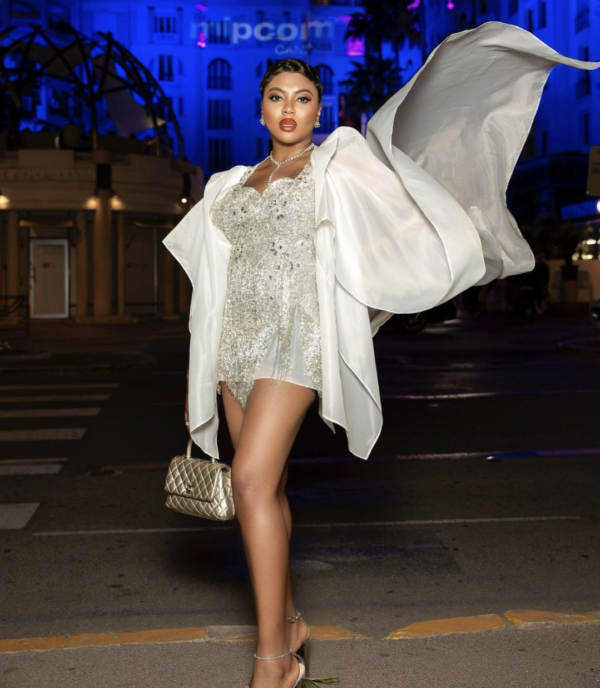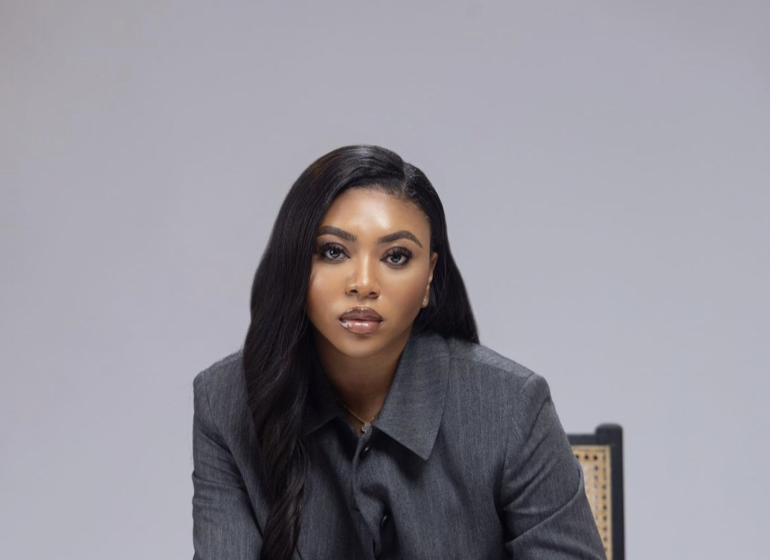Stephanie Coker Aderinokun, a multitalented TV host and actress, is using her platform to advocate for Nigerian women and girls living with Polycystic Ovarian Syndrome (PCOS). She recently produced a documentary called ‘Where The Heck Is My Period?’ to shed light on symptoms such as infertility, hormonal imbalances, acne, and hirsutism.
In this interview with TheCable Lifestyle’s DEBORAH BODUNDE, the 35-year-old media personality shares her experiences with PCOS and how it affects her personal and professional life, including the reproductive challenges, conflicts with her husband as well as her physical appearance. She also discusses the societal pressure she faces as a public figure and her long-term vision, which includes legislative action and creating a supportive community for women with PCOS.
What inspired the production of ‘Where The Heck Is My Period?’ and what message are you hoping to convey?
Stephanie Coker: The documentary was inspired by my personal experiences with polycystic ovarian syndrome and I’m hoping that we can create more awareness through this documentary. So people who don’t know the symptoms will be educated on what to look out for themselves and also for other women they know who might be finding it hard to conceive and who might have blood sugar level issues and hormonal imbalance so that they can find out whether or not they have PCOS.

Did you move back to Nigeria because of the documentary?
Stephanie Coker: No, I didn’t move back to Nigeria because of creating awareness about PCOS. I’ve returned to the country for about 11 to 12 years now. So no, it wasn’t because of that. I mean, I moved back because I just wanted to try a different environment. But by being in Nigeria, I’m able to make more of an impact on women like me, that is other Nigerian women living with this condition. Even by just being a role model and doing this kind of advocacy, I can make an impact and be, I don’t know, some sort of assistance.
Was it challenging getting the women to share their stories in your documentary?
Stephanie Coker: Yes, absolutely. We had a lot of women who didn’t want to show their faces due to stigma, what people who know them would say about finding out that they have PCOS, and because they don’t want to seem like they’re oversharing. In this part of the world, you know, we like to keep things affecting us to ourselves so that it doesn’t seem like we’re airing our laundry outside. I wouldn’t want to use the term dirty because it’s not dirty, but I think it’s just like whatever is really upsetting or hurting us, we don’t usually like to talk about it because of fear of what others will say. So that, I think, is what was hindering a lot of women from coming forward. But for those that opened up, we didn’t really have to do much. They were very excited because they wanted to be heard, they wanted people to see what they’re dealing with and how they have made a way for themselves and getting on with life. They showed their strength and just wanted a platform to share their experiences so that other women with PCOS could feel like they were not alone. A lot of the women also used it as therapy because it’s not easy to have something like this and not have someone who will listen. But just having the camera there and just being able to go on and on, I think was quite soothing for them.
What were some of the most impactful moments for you during production?
Stephanie Coker: Oh, there are quite a number of stories but I would say definitely Miss Binta who lost her baby. That really stuck out to me because it was such a hard moment to watch someone relive and tell such a personal and tragic experience on camera. I think that really touched everyone on set. Personally, I’ve never really experienced that happen to someone and just seeing the person talk about it, and recount how it happened, was just a lot and that really stuck out to me. Also, the lady that spoke about how PCOS affected her marriage and now that she is divorced she’s still trying to have a child and it hasn’t happened. Just her being vulnerable to open up about her journey really made me look at these women and think wow, they’re so strong and they’ve been through so much. Every time I hear different people’s stories with PCOS, it just makes me think that this documentary needed to happen.
How has living with PCOS affected your personal and professional life?
Stephanie Coker: PCOS, as you know, affects so many different aspects of a woman’s body, mental, physical, and emotional. It has affected my mood and so even when I’m working I get tired. But I will say that when you work in the media it is very hard to mask. But it’s funny how much it has affected me but you wouldn’t know because I’m good at masking. So even though it should affect my work, like not being able to come on set, it doesn’t because the show must go on. In terms of my personal life, I think the major one is definitely trying to conceive. PCOS really affected that process and made it difficult. Also, I have symptoms of acne and hirsutism which made me very self-conscious of the hair on my body and face, especially being in front of cameras 24/7. It made it very hard to be in front of the camera and be comfortable.
How have you been able to overcome these challenges over the years?
Stephanie Coker: Spending lots of money on dermatology and laser hair removal, honestly. But outside of that, when I’m going on set I do more preparation than the average woman. I have to carry loads of period pads and tampons around just in case, because of the irregularity in my menstrual cycle. It could just appear and I’d be on set, which is crazy. I also just get on with it, to be honest.
Can you talk about the role that emotional support from your husband played in your journey?
Stephanie Coker: It’s his understanding and knowing that I have this condition. I think everything is due to understanding someone and actually caring enough to take note of what is going on within that person’s body. Also researching, so that when your partner knows why certain things happen, they can help. But when somebody doesn’t know or understand or doesn’t care to know, it’s going to be very difficult because you always have to keep explaining. Unlike when they follow you to your doctor’s visits and are present. He was supportive with his presence and willing to understand what PCOS is and what the symptoms are. So when I say this is happening because of this, he knows and isn’t just like why are you behaving like that or why are you doing that? Partners of people with PCOS should be willing to look into the condition and see what it is that is making their loved one behave a certain way, feel a certain way, and look a certain way.
Were there times when this condition caused a strain in your relationship with your husband?
Stephanie Coker: I wouldn’t really say it caused a strain but I have insomnia because of PCOS. He sleeps early and I can’t, so I literally want to keep the lights on and he wants to keep the lights off. Sometimes I have to leave the room or else I’ll be looking at my screen in the dark. I think another thing is that PCOS messes with my memory. He’s very organised and has OCD and I’m very scattered and all over the place. But yeah, that’s when I would say that there’s conflict because it’s like two ends of the spectrum trying to live together.

Has PCOS affected your body image in any way?
Stephanie Coker: Yeah, because honestly, there’s something called cortisol belly or like the PCOS pouch in general. Even when I was a size eight, I still had belly fat and really wanted to wear stuff that was more revealing like crop tops but the belly is just there. And yeah, that has to do with PCOS because there’s a lot of inflammation and your body tends to hold fat in that area. That is one way I would say it has affected my body image and I still haven’t gone to do this liposuction.
How do you handle negative comments from people, and what advice would you give to women facing similar challenges?
Stephanie Coker: Well, I try not to read comments. I protect my space, mind, and what I read and see about myself. So to be honest, sometimes I really don’t read, I don’t look, and if I see, I just close my phone and move on to something else. It’s important for you to protect your peace because negative comments may ruin the entire day. Trolls don’t care about the effects of their actions, some would outrightly just say that you’re fat and that your leg is ugly. So the best thing is to ignore unless the comments are constructive and would help you with your craft or with how you dress. I also limit people’s access to me and I’m very specific about the people that have access to me. Women facing similar challenges have to surround themselves with the right people and friends who can uplift them. You need to have discernment when it comes to the people you keep in your space.
What are some misconceptions about PCOS that you hope to dispel through the documentary?
Stephanie Coker: One is that women with PCOS can’t have children and that their only issue is conception. That’s not true. PCOS can cause life-threatening illnesses like type 2 diabetes, cardiovascular diseases, endometrial cancer, and sleep apnea. Even statistics have shown that 50% of women with PCOS will go on to have type 2 diabetes by the age of 40. Another misconception is women with PCOS can’t lose weight. That’s also not true. Women with PCOS just find it harder to lose weight but it’s not impossible. Also, not all women with PCOS experience unwanted hair growth. It’s one of the symptoms and not all women have the same symptoms. Another myth is that all women with PCOS have ovarian cysts. Not all women diagnosed with PCOS have follicles on their ovaries.
What advice would you give to young girls who may be experiencing the symptoms of PCOS but are unsure about how to seek help?
Stephanie Coker: The main thing is to go to a hospital, speak to a gynecologist, and get tested. I think that’s the best possible way to clear all doubts. Get ultrasounds through LH and FSH blood tests. There’s no point in self-diagnosing and it’s better to seek medical help.
What are the initiatives you have planned through The Future Is Her, your nonprofit organisation?
Stephanie Coker: The Future Is Her is now focused on creating awareness of PCOS and helping women living with the condition. We’re dedicated to education and early diagnosis and our aim is to get as many women tested as possible. We are actually going on a university tour from September around Nigeria to test young women in universities and also educate them.
What is your long-term vision for raising awareness about PCOS, and how do you hope to make a lasting impact?
Stephanie Coker: I would like for a legislative bill to be passed in the House of Representatives regarding the testing, early diagnosis and education of PCOS. Studies have shown that it affects one in six women of reproductive age in Nigeria. So I think it’s something that we should really take seriously. Another thing is that we want to create a community where we can help with funding testing for women who are trying to get tested and also create a support system and group for these women as well.

Should we expect to see you on our screens anytime soon, and are you working on any projects?
Stephanie Coker: Yeah absolutely. Another big news is that I’m on a film course at the British Council Film, and I just won a grant to produce my short film. I was one of the winners and 10 of us were given the grants and it is like 5000 pounds each to produce a short film. We’re also working with big industry scriptwriters. So I will be producing a short film very soon and I’m going to be one of the next top emerging filmmakers, basically. That’s a really big deal and it’s going to be announced soon.
Do you have any Nollywood movies in the works?
Stephanie Coker: Yeah, the recent one is called ‘Aso Ebi Diaries’ and I was partners with Denrele Edun. There are other ongoing productions but I signed an NDA.
Copyright 2024 TheCable. All rights reserved. This material, and other digital content on this website, may not be reproduced, published, broadcast, rewritten or redistributed in whole or in part without prior express written permission from TheCable.
Follow us on twitter @Thecablestyle

